RUDE CHESS Tags: Games, Small games, Covemountlikes, Happenings, Nordic Game Jam Baba Is You update 1.09 on Nintendo Switch (version 462) Tags: Games, Baba Is You Unrectangles Tags: Paper puzzles Bunnyhop! Tags: Paper puzzles Website update! Tags: Other Triangle field Tags: Paper puzzles Plans for 2022 Tags: Games, Baba Is You, ESA 2, Other, Plans, Regular updates, Streaming, Small games Snake nest Tags: Paper puzzles Plot twist Tags: Paper puzzles, Plans Baba Is You update for Switch Tags: Games, Baba Is You Pages
Posted on 2022-05-04 03:12
Heyy, after a long while I’ve actually finished a small game! My dreams of releasing a small game every month this year have shattered already but at least there’s this (and should be some more before the year ends).
I was at Nordic Game Jam last weekend; it was great to be at an event like this for the first time in 3 years, and due to recent mistakes with game jams (don’t try making menu-heavy games at game jams) I was kind of hankering to make something small. I had this funky puzzle idea in my head, and thought it vaguely fit the themes I drew (“Schadenfreude” and “Matching”), so decided to go with this concept instead of thinking up something new. It’s nice to get some of these ideas out without too much effort.
I’ve now polished the game a bit; it offers 14 levels of somewhat mysterious puzzling fun.
Look at the game here!
Posted on 2022-03-22 23:28
Changelog:
– Removed some unfinished translations from the game files until they’re more complete
– New level in Familiar Lands!
– Fixed | not showing in the hand-drawn font
– Fixed a small visual glitch in the main game
– Fixed a recursive submenu bug
– Fix to a cornercase where Fear would cause an object to move in a buggy way
– Fixed Power not working with Level
– Added support for multiple Power/Powered words
– Fixed Seeing and Power not working together
– Fixed lua errors with Baba and Play
– Fixed broken Play notes
– Fixed some language file quirks
– You can now see the level code in the pause menu
– You can now see the level code when browsing the “Play Custom Levels” menu
– New level in Land of Vehicles
– Fixed a bug where the quickbar could have non-existent objects
– You can now enter level codes without the hyphen and the game will add it automatically
– Level Is Chill works now
– * added to the in-game font
– Fixed level numbering in Starry Lands
– The way conditionals are handled in the code was reworked heavily
– Fixed “Baba Play Not A” not disabling “Baba Play A”
– The pause menu buttons should now stretch horizontally if needed
– Added Cheese, Chair, Bomb & Table
– Fixed Level not working with multiple conditionals
– Fixed objects blinking annoyingly in 3D
– Fixed an Empty & Chill interaction
– Fixed an Empty & Facing interaction
– Fixed a bug where Empty Is Move would make Empty move randomly even when it shouldn’t
– Implemented some stuff for displaying Thai
– New level in Land of Oddities
– Implemented an optimization for Power/Powered that should speed them up a lot
– Another new level in Land of Oddities (thanks to Misshapensmiley for showing this variant idea!)
– A large optimization to sentences placed next to each other; something like “Baba Is You Rock Is Push” now separates the two rules earlier in the parsing process to prevent unnecessary processing
– Fixed a buggy interaction between Word & Feeling (potentially also Powered)
– Fixed Pull breaking if you pull more than 2 objects more than one tile at a time
– Added a drop shadow for signpost text
– Fixed a bug where Still objects could be Swapped in certain circumstances
– Fixed a bug where text stacked with letters could break rule parsing
– Fixed a bug where the outcome of a Powered condition check could be affected by particle effects
– Fixed signposts losing their text after being destroyed
– Fixed Not Without working differently from how it used to in how it handles multiple parameters
– Added some missing translations
– Fixed some oversights with word-wrapping
Posted on 2022-02-20 04:03
Welp! 3 puzzle types in less than a week, I think?
This one was somewhat inspired by Shape Grid by Eric Friedman. I had really liked the idea of that genre and pondered on similar designs at the back of my head for a longer time.
Anyway, here’re the rules:
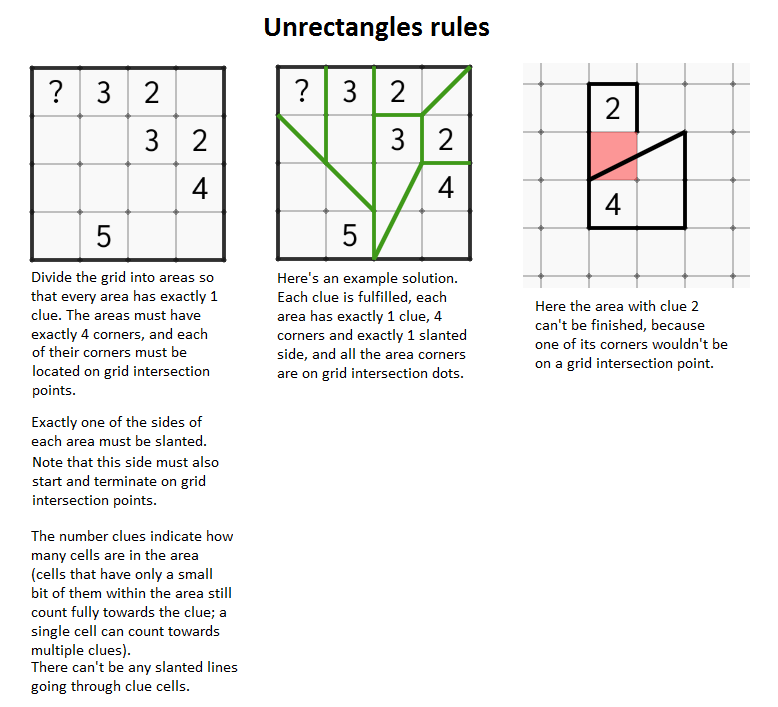
And 3 puzzles:
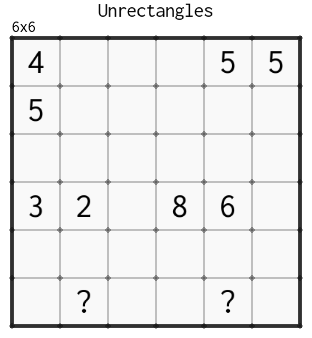
1.
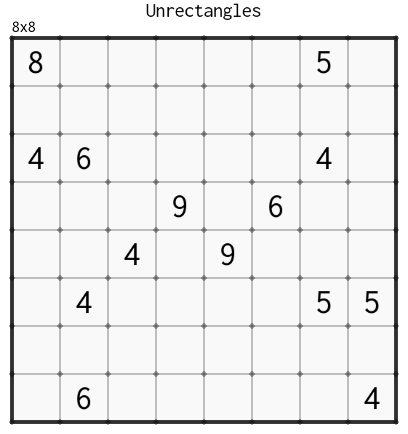
2.
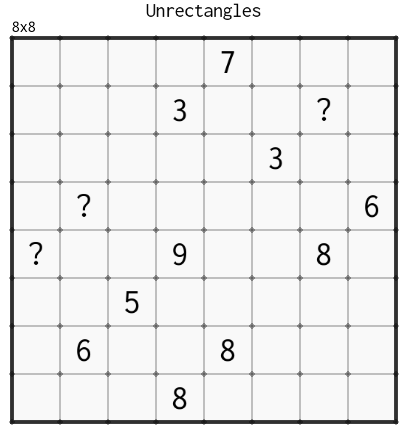
3.
Posted on 2022-02-17 01:35
Another new paper puzzle so soon? Why yes!
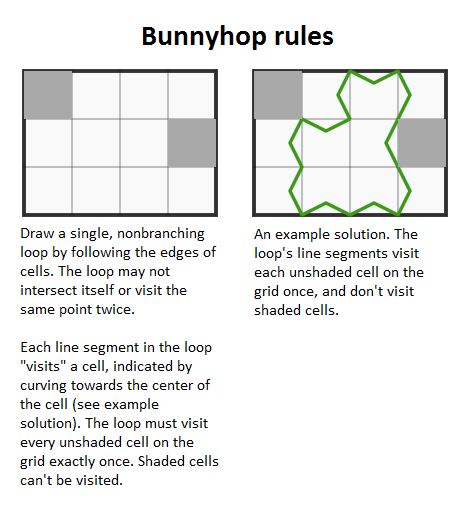
Puzzles:
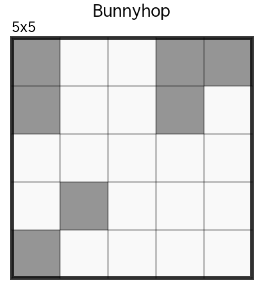
1. (Updated)
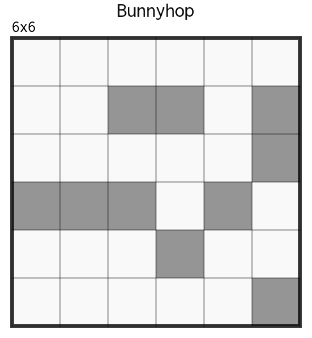
2. (Updated)
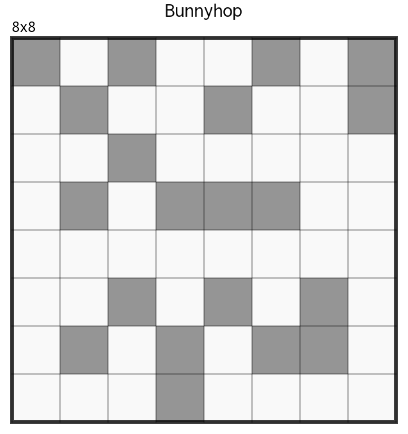
3.
Posted on 2022-02-16 11:53
I made a tiny update to the main website page. It’s been accumulating games for a long time now I’ve been having some trouble actually fitting all of them on there, so I’ve now divided the games into three (admittedly really vague) categories. Now there’s space for more again!
Posted on 2022-02-15 13:37
Heyy, first paper puzzle genre of the year! Soon I will have been making these for 2 years, welp.
Anyway, this one is slightly odd but also interesting? Maybe?? Relatedly, I’ve also updated the paper puzzle collection with some of my newer types!
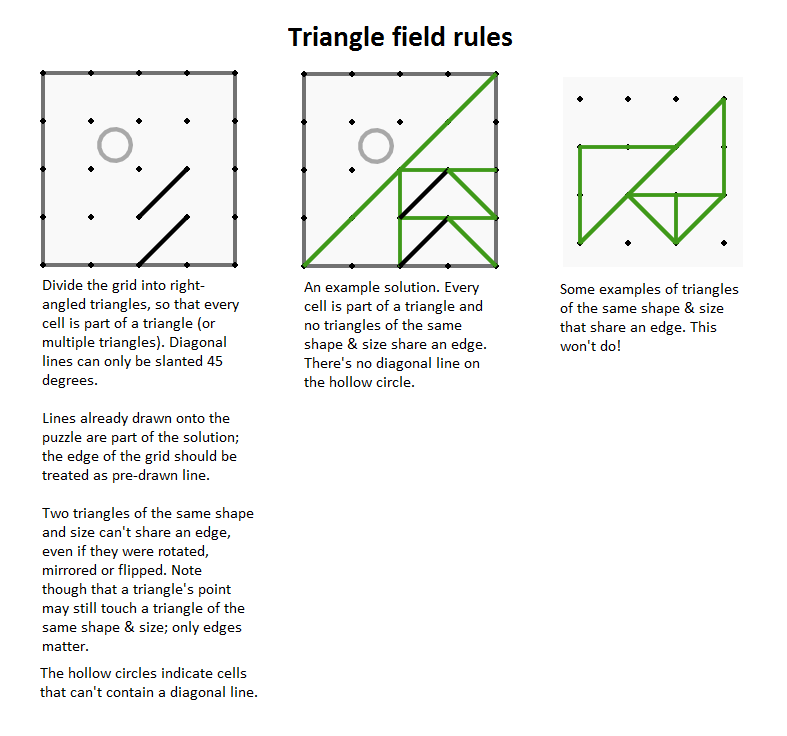
And puzzles:
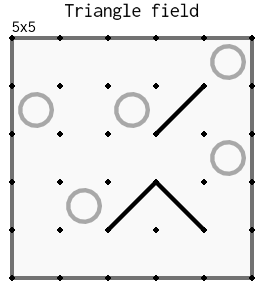
1
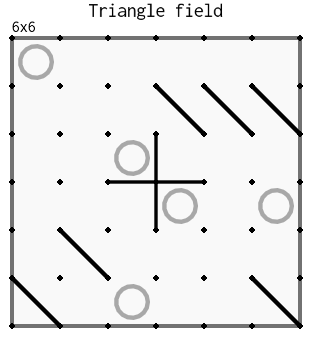
2 (updated, thanks dohz!)
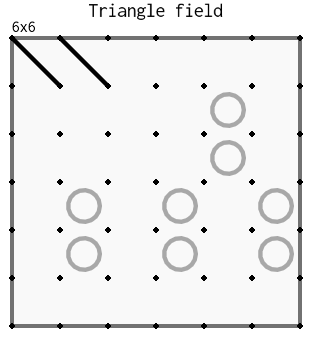
3
Posted on 2022-01-03 00:22
Hi everyone! My internship is now over and while I haven’t graduated, a big step on my way into psychologisthood has now been taken.
Anyway, I didn’t manage to write much of anything here during the internship, but near the end of the year I started making some plans on what I’d like to change in my life for 2022, and I thought it’d make sense to share some of those plans, insofar as they relate to game development. Most of this is copy-pasted from my personal Discord server, but whatever.
I’ve noted that a big problem for my work & everyday life is how difficult it usually is to differentiate between work and non-work, especially on the internet. In order to improve on this, I’ll try to follow a slightly stricter schedule this year in terms of when I do what. I drafted a tentative sketch for what my workweek might look like:
Mon-Wed: Work on ESA2 and other non-Baba game projects
Wed: Stream 1 – work on ESA2 and other non-Baba game projects
Thur-Fri: Work on Baba Is You
Fri: Stream 2 – work on Baba Is You
Sat-Sun: Time off; I probably won’t be able to keep my mind off videogames so I won’t pretend that I wouldn’t do any game work here, but I’ll try to keep it very relaxed and non-work-like.
I might on some weeks switch the days around or make other changes, stream more often and so on, but it’d be nice to have a general guideline to follow that I can refer to when pondering what to do on a given day and how to spend my days.
Relating to the “other non-Baba game projects”, I have a largeish plan for 2022 that’ll be the other major non-Baba thing alongside ESA2: I want to make a small game every month this year! The idea would be that I take one idea that I’ve pondered about but not implemented and make a prototype out of it, 12 times over the year. However, my goal would be to actually have something playable, not just a rough proof-of-concept. I’m pretty excited about this concept! I might use a format similar to what Petri Purho used during the year that gave us Crayon Physics, in that even though I’ll make a game every month, I’ll only work 7 days maximum on a given game. We’ll see!
Oh yeah, also Baba Is You got its major update, Baba Make Level, last November! Kind of embarrassing that I wrote nothing about it here, but as I said in some previous post, I’ll try to get a round-up “what’s cooking” post done sometime and address all the little things I haven’t mentioned here there and then.
Happy new year!
Posted on 2021-12-26 17:26
Happy holidays! Here’s a kinda messy paper puzzle type to celebrate. It had the odd quality of seeming simple in my head but being quite difficult to explain in writing. I hope it’s still at least somewhat enjoyable.
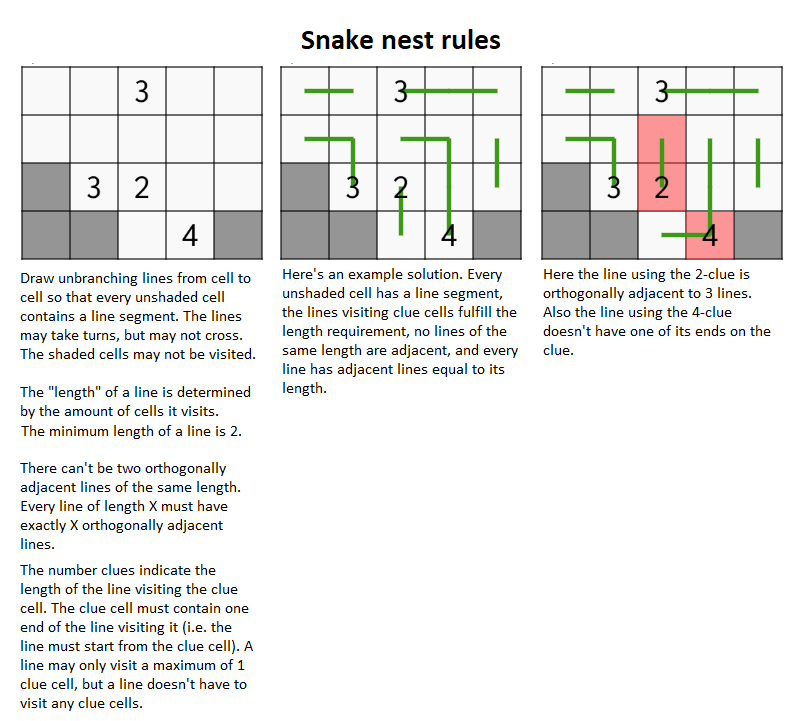
And here’re some puzzles:
(Broken image)
(Broken image)
(Broken image)
(Broken image)
[Below are the actual puzzles, for the sake of usability]




Posted on 2021-12-17 23:17
We’re nearing the end of the year, and it’s time for another paper puzzle type! Quite satisfied with this one. In a week or so I’ll be done with my internship, after which I’ll have more time for Computer Things again, which’ll enable me to be more on top of things as well. Or so I hope, at least.
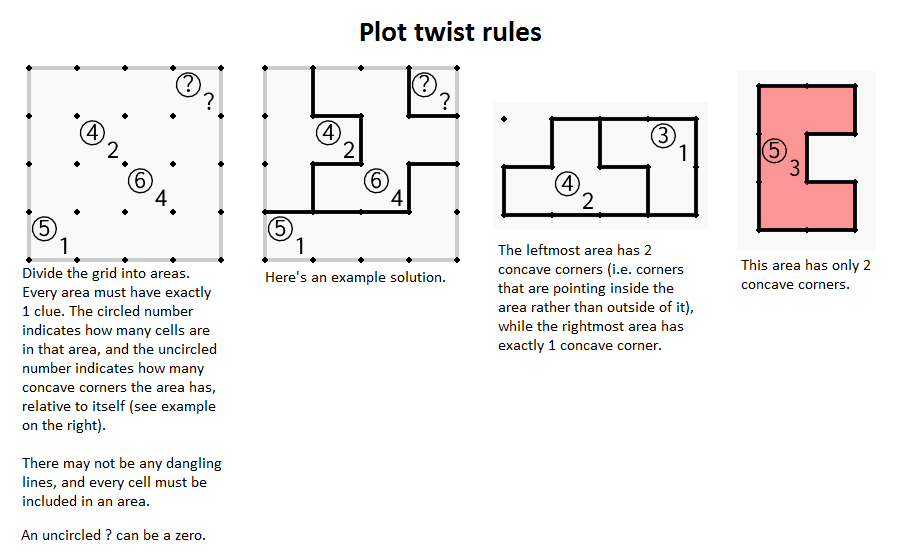
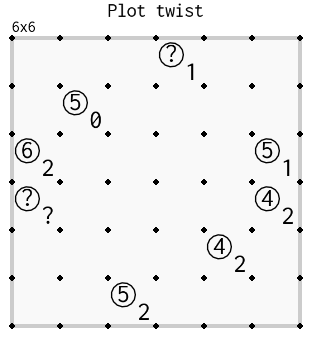
1.
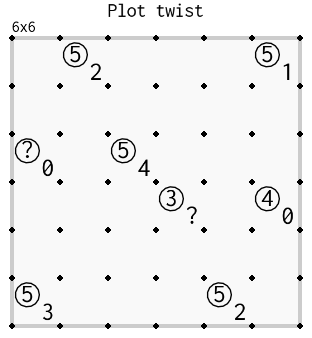
2.
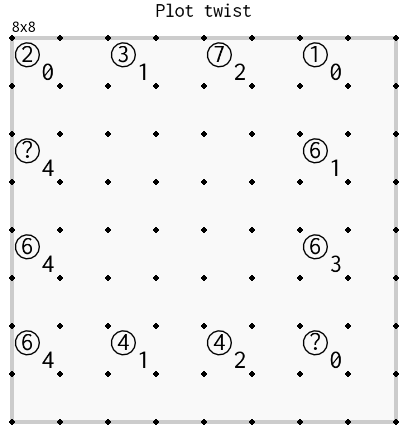
3.
Posted on 2021-12-16 09:34
The Switch patch is finally here! Huge apologies for things taking this long, there were some unexpected bumps on the way. The current version has some issues with a couple of the supported languages, and we’ll be running another patch soon to rectify that. Thank you for your support and patience!
Changelog:
Fixed a bug with the map music in the new maps
Added 10 levels to New Adventures
Added 4 levels to Museum
Fixes to the Polish translation
Fixed a bug that could send you to the wrong level
Fixed a crash in the Switch level editor
The game now tracks levels you’ve downloaded and solved! If you delete and download the same level, the game should still show your past completion in the “Featured Levels” & “Play Levels” menus (doesn’t work retroactively, sorry)
Fixed an issue where certain uppercase symbols could break the hand-drawn font
Added several missing translation lines in. Sorry about that!
Renamed certain levels with placeholder names
Reworked the way Revert works; it should now be more optimized and not bug as easily
Levels adjusted:
Written In Stone (was previously impossible, apologies)
Skull Pile (was previously impossible, apologies)
Teamwork Is A Must (was previously impossible, apologies)
New Adventures!
Seeing B
Land of Oddities
Baba Is Empty
Experiment
Land Land Land
Hangar
Land of Vehicles
Ventilation Shaft
Skygate
Spaceport
Rapid Growth
Sturdy Flowers
Safety Vest
Tangled Passage
Waiting For You
Feeling Dangerous
Dangerous Feeling
Secret Clearing
Garden? What Garden?
House House
Haunted Spa (thanks to Axerity for the fix!)
Blow The Candles Out
Parakeet Bouncer
Antigravity
Pushing Uphill
Happy Dance
Harvest Party
Gone Fishing
Sun Boulevard
Milky Way
Set The Stage
Fragile Existence – Old (major fix)
More Unused Levels (big adjustment)
Train
Train 2
Land of Delicacies
Appetizer
Sideways Fireplace
Private Garden
Safety Box
Safety Box 2
Moonrise, Sunset
More Unused Levels
Turmoil In The Clouds (major fix)
Treasure Chest
Set The Stage
Quarters
Experiment
Ventilation Shaft
Cloud Apartment
Baba Fields
Outreach (full redesign)
Shiny Ladder
Hidden Blueprints
There And Back
Smelting Facility (thanks to Axerity for suggestions!)
Exclusive Membership
Once More With Feeling!
Where Am I Going?
Seeing A
Fertile Ground
Supply Route
Planet Baba
Destructive Presence
ABAB CD EFG
Baba Needs Friends
Keke The Guard
Seasons
First Previous 1 2 3 4 5 6 7 8 9 10 11 12 13 14 15 16 17 18 19 20 21 22 23 24 25 26 27 28 29 30 31 32 33 34 35 36 37 38 39 40 41 42 43 44 45 46 47 48 49 50 51 52 53 54 55 56 57 58 59 60 61 62 63 64 65 Next Last